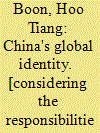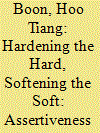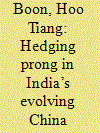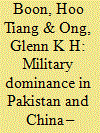|
|
|
Sort Order |
|
|
|
Items / Page
|
|
|
|
|
|
|
| Srl | Item |
| 1 |
ID:
152931


|
|
|
|
|
| Summary/Abstract |
Some scholars believe that as China’s power grows more preponderant, it will leverage its growing might to impose its will on others in the international system. This article engages this debate by probing China’s relationship with small states, going beyond those in its region. Small states are particularly apposite because their size and power deficiencies suggest they are among the most vulnerable to pressure or coercion from big powers such as China. Beijing’s diplomacy towards small states, therefore, represents a barometer of Chinese restraint and exercise of its power in a situation of clear power superiority. The article studies this dynamic, unpacking the contours and shape of China’s relations with small states, as well as the narratives and rationales that drive this relationship.
|
|
|
|
|
|
|
|
|
|
|
|
|
|
|
|
| 2 |
ID:
167709


|
|
|
|
|
| Publication |
Washington, D C, Georgetown University Press, 2018.
|
| Description |
xxxi, 196p.: ill.pbk
|
| Standard Number |
9781626166141
|
|
|
|
|
|
|
|
|
|
|
|
Copies: C:1/I:0,R:0,Q:0
Circulation
| Accession# | Call# | Current Location | Status | Policy | Location |
| 059716 | 327.51/BOO 059716 | Main | On Shelf | General | |
|
|
|
|
| 3 |
ID:
153323


|
|
|
|
|
| Summary/Abstract |
There is a growing view that the emerging brand of Chinese regional diplomacy in recent years is increasingly assertive. This article attempts to make better sense of this perceived more forceful Chinese diplomacy. It argues that Chinese regional behavior is more profitably understood through the lens of a two-pronged foreign policy strategy that combines two particular aspects. One is a tougher and more uncompromising approach toward issues that China regards as concerning its core interests. The other is a more flexible and cooperative position toward interests that, while significant, are of secondary importance.
|
|
|
|
|
|
|
|
|
|
|
|
|
|
|
|
| 4 |
ID:
147610


|
|
|
|
|
| Summary/Abstract |
This article addresses Sino–Indian relations from the alternative and under-engaged lens of hedging, as opposed to the more conventional balancing and bandwagoning dichotomy. It analyzes why and how, despite the general stable state of and progress in Sino–Indian relations, Delhi has pursued a hedging strategy against China. Under the present Modi administration, India has not deviated markedly from its traditionally prudent foreign policy approach towards China. Yet, there have been discernible changes and, arguably, the main departure from the previous government’s policy is a matter of degree: a more consolidated hedging component combined with a more robust engagement policy towards China. Like several countries in the Indo–Pacific confronted with the rise of China, India remains strategically ambivalent about China.
|
|
|
|
|
|
|
|
|
|
|
|
|
|
|
|
| 5 |
ID:
192086


|
|
|
|
|
| Summary/Abstract |
Since early 2023, China has sought to play a more active crisis resolution role in the Russia-Ukraine war, marking a shift in Chinese behaviour on the conflict. What explains China’s pursuit of this role, an agenda that has been described as a ‘fool’s errand,’ not least because of the seeming difficulties of real peace between Kyiv and Moscow without one side capitulating to the other? One interpretation is that China’s behaviour is part of a broader trend of ambitions to play a bigger role in addressing global hotspots and project itself as a responsible power. It parallels Beijing’s involvement in brokering the Saudi-Iran rapprochement as well as attempts to mediate in the Israeli-Palestinian conflict. Yet, such ambitions are only part of the story. There are more contingent considerations behind the subtle but distinct change in Chinese positioning on the war. Far from being a ‘fool’s errand,’ Beijing’s peacemaker posturing is borne out of calculations taken to minimise risks to Chinese interests as a consequence of the war. Taking into account documentary sources and views from China, this article unpacks those calculations to provide a fuller explanation behind the shift in Chinese behaviour.
|
|
|
|
|
|
|
|
|
|
|
|
|
|
|
|
| 6 |
ID:
183366


|
|
|
|
|
| Summary/Abstract |
The China–Pakistan Economic Corridor (CPEC) has been touted as the centrepiece of China’s Belt and Road Initiative and the key to its strategic partnership with Pakistan. Notwithstanding claims about the CPEC’s economic potential, however, Islamabad’s economy continues to be dire. This article attempts to better understand the ramifications of Pakistan’s economic viability and its consequences for China. It does so by examining China–Pakistan relations from the lens of Pakistan’s civil–military relations, paying attention in particular to what the Pakistan Armed Forces (PMA)’s domestic dominance means for China’s interests, including economic interests, in Pakistan. We suggest that PMA preponderance and its attendant influence on the country’s economic performance bring another dimension to interpreting Sino-Pakistani relations. As Beijing’s most trusted political partner in Pakistan, the PMA’s local dominance has considerable benefits for China, particularly in the security and political aspects of its interests. However, this dominance also entails a number of complications for Chinese economic interests, a factor that has implications for the future of China’s CPEC investments and their financial sustainability.
|
|
|
|
|
|
|
|
|
|
|
|
|
|
|
|
| 7 |
ID:
178113


|
|
|
|
|
| Summary/Abstract |
The notion of strategic ambiguity has long guided the United States’ engagement in cross-strait relations, requiring that Washington is intentionally unclear about whether and how it would intervene in a China–Taiwan conflict in order to preserve a balance of assurance and deterrence for both sides. This article unpacks the US approach to strategic ambiguity under Trump. Adopting a neo-classical realist perspective, it argues that domestic and individual level drivers—in particular, US populism, Congress and the foreign policy establishment, and Trump's transactional and personalized approach to foreign policy—have interacted with the shifting US–China balance of power to produce a different mode of American strategic ambiguity in the Taiwan Strait. A common view is that as a function of the growing US–China power competition, the US has largely leaned towards Taiwan in recent years. Our analysis revises this assessment by revealing a form of strategic ambiguity under Trump that, despite appearing to upset the balance of ambiguity in favour of Taiwan—paradoxically and probably unintentionally—maintains assurances and warnings for both China and Taiwan. Yet, while Trump has arguably preserved the overall balance of strategic ambiguity, he has introduced greater volatility into cross-strait relations.
|
|
|
|
|
|
|
|
|
|
|
|
|
|
|
|
|
|
|
|
|